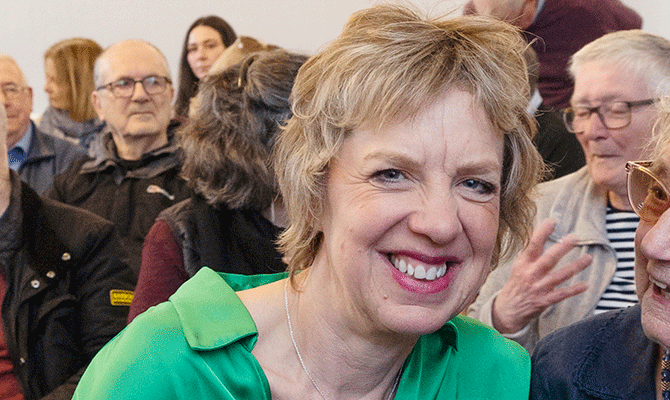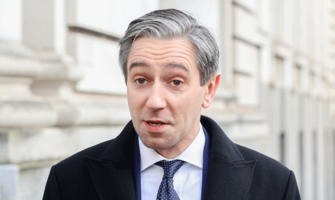
Ivana Bacik
SUPPORTIVE MEDIA pundits and Labour members themselves have already seized on the constituency revisions to explain why the party faces electoral Armageddon in the near future and how it is down to the Electoral Commission’s perverse emphasis on three-seat constituencies and so on. But as Phoenix readers will know, a glance at the constituencies in which the party’s seven TDs are situated shows that Labour was already facing an electoral hiding of historic, even terminal proportions, regardless of the boundary changes that have been revealed.
As recently as last July Goldhawk noted “that SF’s [Sinn Féin’s] Pat Buckley polled 23.1% of first preferences, practically double that of Labour TD Seán Sherlock’s 12.1% [in 2020, which] means that if SF runs two candidates, Sherlock could be a Labour loss. Sherlock is not the only TD in the current Dáil hoping to be rescued by a favourable recommendation from the Electoral Commission” (see The Phoenix 28/7/23). Oh, the irony.
The fact is SF will be running two candidates in Cork East and the Electoral Commission has butchered Sherlock’s base, rendering his re-election prospects very dicey indeed. But the TD was already preparing for a battle to save his political life and that of Labour in Cork due to SF’s determination to take a second seat in Cork East or alternatively Cork North-Central, into which constituency Sherlock’s Mallow base has now been moved.
Only Alan ‘AK47’ Kelly knows if he would prefer to be a TD or an MEP but the former party leader may not be brimming with comradely zeal to save Labour and risk a demoralising defeat in the new, three-seat Tipperary North constituency. But AK47 was already facing a stiff test in Tipp, whether or not the constituency was restructured (see The Phoenix 5/5/23). If he runs in the general election at all may simply be decided by his success or failure in the EU elections in June.
George Lawlor is tipped to replace a likely retiring TD, ex-party leader and ‘austerity junkie’ Brendan Howlin in Wexford, but even before the commission took a wrecking ball to constituencies in the south east, the Labour seat here had been targeted by SF and Fianna Fáil senator Malcolm Byrne. That the constituency goes down from five seats to four means only that a Labour loss is more likely than previously considered (see The Phoenix 12/8/22).

Alan Kelly
Louth TD Ged Nash will be glad that the five-seat constituency has not lost a seat but it has lost areas of Nash’s support – something he can ill afford as he came in on the final count here in 2020 and only with a large transfer from the Green’s Mark Deary (see The Phoenix 20/5/22). That is an unlikely scenario at the next general election for various reasons and both SF and FF will be targeting Nash’s seat. The loss of Nash would be more serious than that of other party TDs as he appears to be the only one that retains a serious commitment to working-class politics as opposed to the social liberalism of most others.
Duncan Smith is reckoned to be the most vulnerable Labour TD as he must now run in three-seat Dublin Fingal-East – five-seat Fingal has been split into two three-seat constituencies – against SF councillor Ann Graves. But as Goldhawk noted (see edition 12/8/22), SF has for long been on course to take Smith’s seat in Fingal.
Some pundits regard Labour TD Aodhán Ó Ríordáin as vulnerable to SF’s drive for a second seat in Dublin Bay North, especially as Social Democrats TD Cian O’Callaghan has become stronger in the last year or so. Others believe both will be re-elected but the count will be a testing time for Ó Ríordáin and his prospects are 50:50, while O’Callaghan – who has become almost as expert as Eoin Ó Broin on the complex but burning issue of housing – is a safer bet.
This leaves party leader Ivana Bacik and even she cannot be relied upon to return to the next Dáil given Labour’s increasing irrelevance. Perhaps the best thing that she has going for her in Dublin Bay South is that the middle class is enraged for a variety of reasons with the Green Party and will vent its spleen on its leader, Eamon Ryan, rather than her.
Calls from concerned liberals for unity between Labour and the Soc Dems, if only to save the former from extinction, will be ignored by the latter for precisely that reason: Holly Cairns as well as the two former co-leaders, Róisín Shortall and Catherine Murphy – who were so cruelly treated by the Labour leadership in times past – are intent on eradicating the memory and the viability of Labour before picking over the bones of its carcass when it suits them.



















